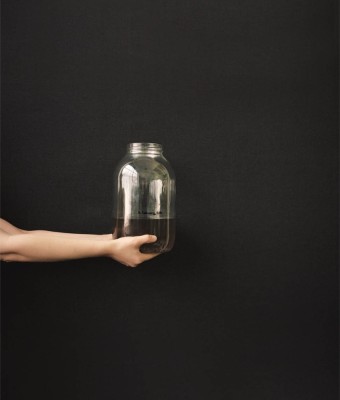Fatma Bučak
Missing words, official truths, violence, and censorship.
And so we were told, 2020, is a series of eighty-four nearly identical photographs. In each two arms hold out a glass jar, half-filled with a dark liquid, bearing a handwritten date, from February 7, 2016 to all of the next 84 days. Photograph No. 10 of the original 135-copy edition is in the collection. The first date in the series coincides with the day of the “cellar massacre,” when more than 100 people were killed in the town of Cizre, in southeastern Turkey on the Syrian border, in Turkish law enforcement’s violent crackdown on Kurdish militant groups. The Turkish press did not report the massacre, which was instead reported in the international press.
Beginning Feb. 7, Fatma Bučak collected and catalogued Turkey’s major newspapers daily, washed away the ink from the press that failed to account for what happened, and collected the liquid in 84 containers, each of which refers to the words of the washed-out newspapers, words they could not tell. The 84 images play on perceptual ambivalence, enchanting in their poetic beauty, with details, shadows, and chiaroscuro that look like oil paintings. The black liquid collected in the transparent jars marked with a date is offered to the audience by Fatma’s white hands, like a secular relic, so that it will not be forgotten. A symbolic gesture of resistance and opposition to censorship, impossible in other forms, that corresponds to a universal invocation to preserve memory.
Fatma Bučak, born in Turkey in 1984, studied Philosophy at Istanbul University and History of Art and Etching at the Albertina Academy of Fine Arts in Italy. She later completed her MA in Photography at the Royal College of Art in London. Bučak’s creative practices span performance, photography, sound, and video, focusing on themes of political identity, cultural and gender norms, and landscape as a medium for historical exploration. Her work delves into the fragility, tension, and irreversibility of history, questioning traditional methods of historical representation by incorporating the power of testimony and memory. Bučak’s exhibitions include prestigious venues such as the Venice Biennale, Castello di Rivoli, Museum of Contemporary Art, Jewish Museum New York, and Museum of Contemporary Art Toronto. Her art is featured in permanent collections at institutions like Fondazione Mario Merz, Arter, MAMbo, Civic Gallery of Modena, and the Unicredit Art Collection. In 2024, she served as a fellow at the American Academy in Rome and has been an artist-in-residence at the Italian Academy for Advanced Studies in America at Columbia University and ISCP in Brooklyn, New York. Bučak directed the documentary film “Almost Married,” which premiered at the International Documentary Film Festival in Amsterdam and co-curated the year-long performance series project “Transition” at YKY in Istanbul. She was honoured as a winner of the 9th Italian Council Award.

